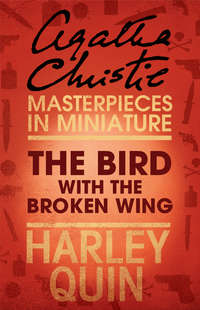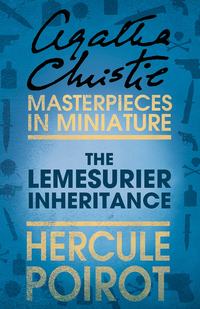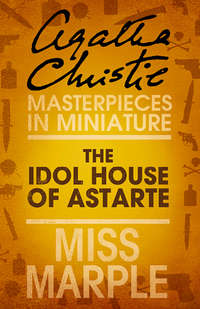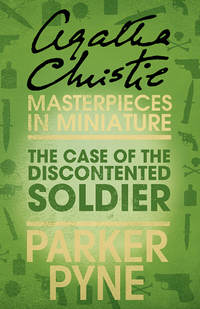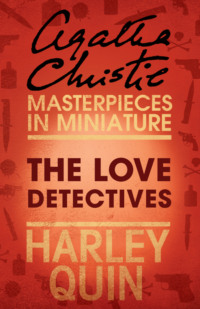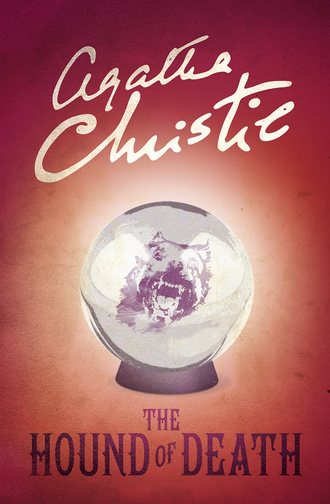
Полная версия
The Hound of Death
‘We must wait till she wakes. It won’t be long, I fancy.’
He was right. At the end of five minutes, Sister Marie Angelique stirred. Her eyes opened dreamily.
‘Where am I?’
‘You are here—at home. You have had a little sleep. You have dreamt, have you not?’
She nodded.
‘Yes, I have dreamt.’
‘You have dreamt of the Crystal?’
‘Yes.’
‘Tell us about it.’
‘You will think me mad, M. le docteur. For see you, in my dream, the Crystal was a holy emblem. I even figured to myself a second Christ, a Teacher of the Crystal who died for his faith, his followers hunted down—persecuted … But the faith endured.
‘The faith endured?’
‘Yes—for fifteen thousand full moons—I mean, for fifteen thousand years.’
‘How long was a full moon?’
‘Thirteen ordinary moons. Yes, it was in the fifteen thousandth full moon—of course, I was a Priestess of the Fifth Sign in the House of the Crystal. It was in the first days of the coming of the Sixth Sign …’
Her brows drew together, a look of fear passed over her face.
‘Too soon,’ she murmured. ‘Too soon. A mistake … Ah! yes, I remember! The Sixth Sign!’
She half sprang to her feet, then dropped back, passing her hand over her face and murmuring:
‘But what am I saying? I am raving. These things never happened.’
‘Now don’t distress yourself.’
But she was looking at him in anguished perplexity.
‘M. le docteur, I do not understand. Why should I have these dreams—these fancies? I was only sixteen when I entered the religious life. I have never travelled. Yet I dream of cities, of strange people, of strange customs. Why?’ She pressed both hands to her head.
‘Have you ever been hypnotized, my sister? Or been in a state of trance?’
‘I have never been hypnotized, M. le docteur. For the other, when at prayer in the chapel, my spirit has often been caught up from my body, and I have been as one dead for many hours. It was undoubtedly a blessed state, the Reverend Mother said—a state of grace. Ah! yes,’ she caught her breath. ‘I remember, we too called it a state of grace.’
‘I would like to try an experiment, my sister.’ Rose spoke in a matter-of-fact voice. ‘It may dispel those painful half-recollections. I will ask you to gaze once more in the crystal. I will then say a certain word to you. You will answer with another. We will continue in this way until you become tired. Concentrate your thoughts on the crystal, not upon the words.’
As I once more unwrapped the crystal and gave it into Sister Marie Angelique’s hands, I noticed the reverent way her hands touched it. Reposing on the black velvet, it lay between her slim palms. Her wonderful deep eyes gazed into it. There was a short silence, and then the doctor said: ‘Hound.’
Immediately Sister Marie Angelique answered ‘Death.’
I do not propose to give a full account of the experiment. Many unimportant and meaningless words were purposely introduced by the doctor. Other words he repeated several times, sometimes getting the same answer to them, sometimes a different one.
That evening in the doctor’s little cottage on the cliffs we discussed the result of the experiment.
He cleared his throat, and drew his note-book closer to him.
‘These results are very interesting—very curious. In answer to the words “Sixth Sign,” we get variously Destruction, Purple, Hound, Power, then again Destruction, and finally Power. Later, as you may have noticed, I reversed the method, with the following results. In answer to Destruction, I get Hound; to Purple, Power; to Hound, Death, again, and to Power, Hound. That all holds together, but on a second repetition of Destruction, I get Sea, which appears utterly irrelevant. To the words “Fifth Sign,” I get Blue, Thoughts, Bird, Blue again, and finally the rather suggestive phrase Opening of mind to mind. From the fact that “Fourth Sign” elicits the word Yellow, and later Light, and that “First Sign” is answered by Blood, I deduce that each Sign had a particular colour, and possibly a particular symbol, that of the Fifth Sign being a bird, and that of the Sixth a hound. However, I surmise that the Fifth Sign represented what is familiarly known as telepathy—the opening of mind to mind. The Sixth Sign undoubtedly stands for the Power of Destruction.’
‘What is the meaning of Sea?’
‘That I confess I cannot explain. I introduced the word later and got the ordinary answer of Boat. To Seventh Sign I got first Life, the second time Love. To Eighth Sign, I got the answer None. I take it therefore that Seven was the sum and number of the signs.’
‘But the Seventh was not achieved,’ I said on a sudden inspiration. ‘Since through the Sixth came Destruction!’
‘Ah! You think so? But we are taking these—mad ramblings very seriously. They are really only interesting from a medical point of view.’
‘Surely they will attract the attention of psychic investigators?’
The doctor’s eyes narrowed. ‘My dear sir, I have no intention of making them public.’
‘Then your interest?’
‘Is purely personal. I shall make notes on the case, of course.’
‘I see.’ But for the first time I felt, like the blind man, that I didn’t see at all. I rose to my feet.
‘Well, I’ll wish you good night, doctor. I’m off to town again tomorrow.’
‘Ah!’ I fancied there was satisfaction, relief perhaps, behind the exclamation.
‘I wish you good luck with your investigations,’ I continued lightly. ‘Don’t loose the Hound of Death on me next time we meet!’
His hand was in mine as I spoke, and I felt the start it gave. He recovered himself quickly. His lips drew back from his long pointed teeth in a smile.
‘For a man who loved power, what a power that would be!’ he said. ‘To hold every human being’s life in the hollow of your hand!’
And his smile broadened.
That was the end of my direct connection with the affair.
Later, the doctor’s note-book and diary came into my hands. I will reproduce the few scanty entries in it here, though you will understand that it did not really come into my possession until some time afterwards.
Aug. 5th. Have discovered that by ‘the Chosen,’ Sister M.A. means those who reproduced the race. Apparently they were held in the highest honour, and exalted above the Priesthood. Contrast this with early Christians.
Aug. 7th. Persuaded Sister M.A. to let me hypnotise her. Succeeded in inducing hypnoptic sleep and trance, but no rapport established.
Aug. 9th. Have there been civilizations in the past to which ours is as nothing? Strange if it should be so, and I the only man with the clue to it …
Aug. 12th. Sister M.A. not at all amenable to suggestion when hypnotized. Yet state of trance easily induced. Cannot understand it.
Aug. 13th. Sister M.A. mentioned today that in ‘state of grace’ the ‘gate must be closed, lest another should command the body’. Interesting—but baffling.
Aug. 18th. So the First Sign is none other than … (words erased here) … then how many centuries will it take to reach the Sixth? But if there should be a short-cut to Power …
Aug. 20th. Have arranged for M.A. to come here with Nurse. Have told her it is necessary to keep patient under morphia. Am I mad? Or shall I be the Superman, with the Power of Death in my hands?
(Here the entries cease.)
It was, I think, on August 29th that I received the letter. It was directed to me, care of my sister-in-law, in a sloping foreign handwriting. I opened it with some curiosity. It ran as follows:
Cher Monsieur,—I have seen you but twice, but I have felt I could trust you. Whether my dreams are real or not, they have grown clearer of late … And, Monsieur, one thing at all events, the Hound of Death is no dream … In the days I told you of (whether they are real or not, I do not know) He Who was Guardian of the Crystal revealed the Sixth Sign to the people too soon … Evil entered into their hearts. They had the power to slay at will—and they slew without justice—in anger. They were drunk with the lust of Power. When we saw this, We who were yet pure, we knew that once again we should not complete the Circle and come to the Sign of Everlasting Life. He who would have been the next Guardian of the Crystal was bidden to act. That the old might die, and the new, after endless ages, might come again, he loosed the Hound of Death upon the sea (being careful not to close the circle), and the sea rose up in the shape of a Hound and swallowed the land utterly …
Once before I remembered this— on the altar steps in Belgium …
The Dr Rose, he is of the Brotherhood. He knows the First Sign, and the form of the Second, though its meaning is hidden to all save a chosen few. He would learn of me the Sixth. I have withstood him so far—but I grow weak. Monsieur, it is not well that a man should come to power before his time. Many centuries must go by ere the world is ready to have the power of death delivered into its hand … I beseech of you, Monsieur, you who love goodness and truth, to help me … before it is too late.
Your sister in Christ,
Marie Angelique
I let the paper fall. The solid earth beneath me seemed a little less solid than usual. Then I began to rally. The poor woman’s belief, genuine enough, had almost affected me! One thing was clear. Dr Rose, in his zeal for a case, was grossly abusing his professional standing. I would run down and—
Suddenly I noticed a letter from Kitty amongst my other correspondence. I tore it open.
‘Such an awful thing has happened,’ I read. ‘You remember Dr Rose’s little cottage on the cliff? It was swept away by a landslide last night, the doctor and that poor nun, Sister Marie Angelique, were killed. The debris on the beach is too awful—all piled up in a fantastic mass—from a distance it looks like a great hound …’
The letter dropped from my hand.
The other facts may be coincidence. A Mr Rose, whom I discovered to be a wealthy relative of the doctor’s, died suddenly that same night—it was said struck by lightning. As far as was known no thunderstorm had occurred in the neighbourhood, but one or two people declared they had heard one peal of thunder. He had an electric burn on him ‘of a curious shape’. His will left everything to his nephew, Dr Rose.
Now, supposing that Dr Rose succeeded in obtaining the secret of the Sixth Sign from Sister Marie Angelique. I had always felt him to be an unscrupulous man—he would not shrink at taking his uncle’s life if he were sure it could not be brought home to him. But one sentence of Sister Marie Angelique’s letter rings in my brain … ‘being careful not to close the Circle …’ Dr Rose did not exercise that care—was perhaps unaware of the steps to take, or even of the need for them. So the Force he employed returned, completing its circuit …
But of course it is all nonsense! Everything can be accounted for quite naturally. That the doctor believed in Sister Marie Angelique’s hallucinations merely proves that his mind, too, was slightly unbalanced.
Yet sometimes I dream of a continent under the seas where men once lived and attained to a degree of civilization far ahead of ours …
Or did Sister Marie Angelique remember backwards—as some say is possible—and is this City of the Circles in the future and not in the past?
Nonsense—of course the whole thing was mere hallucination!
The Red Signal
‘No, but how too thrilling,’ said pretty Mrs Eversleigh, opening her lovely, but slightly vacant eyes very wide. ‘They always say women have a sixth sense; do you think it’s true, Sir Alington?’
The famous alienist smiled sardonically. He had an unbounded contempt for the foolish pretty type, such as his fellow guest. Alington West was the supreme authority on mental disease, and he was fully alive to his own position and importance. A slightly pompous man of full figure.
‘A great deal of nonsense is talked, I know that, Mrs Eversleigh. What does the term mean—a sixth sense?’
‘You scientific men are always so severe. And it really is extraordinary the way one seems to positively know things sometimes—just know them, feel them, I mean—quite uncanny—it really is. Claire knows what I mean, don’t you, Claire?’
She appealed to her hostess with a slight pout, and a tilted shoulder.
Claire Trent did not reply at once. It was a small dinner party, she and her husband, Violet Eversleigh, Sir Alington West, and his nephew, Dermot West, who was an old friend of Jack Trent’s. Jack Trent himself, a somewhat heavy florid man, with a good-humoured smile, and a pleasant lazy laugh, took up the thread.
‘Bunkum, Violet! Your best friend is killed in a railway accident. Straight away you remember that you dreamt of a black cat last Tuesday—marvellous, you felt all along that something was going to happen!’
‘Oh, no, Jack, you’re mixing up premonitions with intuition now. Come, now, Sir Alington, you must admit that premonitions are real?’
‘To a certain extent, perhaps,’ admitted the physician cautiously. ‘But coincidence accounts for a good deal, and then there is the invariable tendency to make the most of a story afterwards—you’ve always got to take that into account.’
‘I don’t think there is any such thing as premonition,’ said Claire Trent, rather abruptly. ‘Or intuition, or a sixth sense, or any of the things we talk about so glibly. We go through life like a train rushing through the darkness to an unknown destination.’
‘That’s hardly a good simile, Mrs Trent,’ said Dermot West, lifting his head for the first time and taking part in the discussion. There was a curious glitter in the clear grey eyes that shone out rather oddly from the deeply tanned face. ‘You’ve forgotten the signals, you see.’
‘The signals?’
‘Yes, green if it’s all right, and red—for danger!’
‘Red—for danger—how thrilling!’ breathed Violet Eversleigh.
Dermot turned from her rather impatiently.
‘That’s just a way of describing it, of course. Danger ahead! The red signal! Look out!’
Trent stared at him curiously.
‘You speak as though it were an actual experience, Dermot, old boy.’
‘So it is—has been, I mean.’
‘Give us the yarn.’
‘I can give you one instance. Out in Mesopotamia—just after the Armistice, I came into my tent one evening with the feeling strong upon me. Danger! Look out! Hadn’t the ghost of a notion what it was all about. I made a round of the camp, fussed unnecessarily, took all precautions against an attack by hostile Arabs. Then I went back to my tent. As soon as I got inside, the feeling popped up again stronger than ever. Danger! In the end, I took a blanket outside, rolled myself up in it and slept there.’
‘Well?’
‘The next morning, when I went inside the tent, first thing I saw was a great knife arrangement—about half a yard long—struck down through my bunk, just where I would have lain. I soon found out about it—one of the Arab servants. His son had been shot as a spy. What have you got to say to that, Uncle Alington, as an example of what I call the red signal?’
The specialist smiled non-committally.
‘A very interesting story, my dear Dermot.’
‘But not one that you would accept unreservedly?’
‘Yes, yes, I have no doubt that you had the premonition of danger, just as you state. But it is the origin of the premonition I dispute. According to you, it came from without, impressed by some outside source upon your mentality. But nowadays we find that nearly everything comes from within—from our subconscious self.’
‘Good old subconscious,’ cried Jack Trent. ‘It’s the jack-of-all-trades nowadays.’
Sir Alington continued without heeding the interruption.
‘I suggest that by some glance or look this Arab had betrayed himself. Your conscious self did not notice or remember, but with your subconscious self it was otherwise. The subconscious never forgets. We believe, too, that it can reason and deduce quite independently of the higher or conscious will. Your subconscious self, then, believed that an attempt might be made to assassinate you, and succeeded in forcing its fear upon your conscious realization.’
‘That sounds very convincing, I admit,’ said Dermot, smiling.
‘But not nearly so exciting,’ pouted Mrs Eversleigh.
‘It is also possible that you may have been subconsciously aware of the hate felt by the man towards you. What in old days used to be called telepathy certainly exists, though the conditions governing it are very little understood.’
‘Have there been any other instances?’ asked Claire of Dermot.
‘Oh! yes, but nothing very pictorial—and I suppose they could all be explained under the heading of coincidence. I refused an invitation to a country house once, for no other reason than the hoisting of the “red signal”. The place was burnt out during the week. By the way, Uncle Alington, where does the subconscious come in there?’
‘I’m afraid it doesn’t,’ said Alington, smiling.
‘But you’ve got an equally good explanation. Come, now. No need to be tactful with near relatives.’
‘Well, then, nephew, I venture to suggest that you refused the invitation for the ordinary reason that you didn’t much want to go, and that after the fire, you suggested to yourself that you had had a warning of danger, which explanation you now believe implicitly.’
‘It’s hopeless,’ laughed Dermot. ‘It’s heads you win, tails I lose.’
‘Never mind, Mr West,’ cried Violet Eversleigh. ‘I believe in your Red Signal implicitly. Is the time in Mesopotamia the last time you had it?’
‘Yes—until—’
‘I beg your pardon?’
‘Nothing.’
Dermot sat silent. The words which had nearly left his lips were: ‘Yes, until tonight.’ They had come quite unbidden to his lips, voicing a thought which had as yet not been consciously realized, but he was aware at once that they were true. The Red Signal was looming up out of the darkness. Danger! Danger close at hand!
But why? What conceivable danger could there be here? Here in the house of his friends? At least—well, yes, there was that kind of danger. He looked at Claire Trent—her whiteness, her slenderness, the exquisite droop of her golden head. But that danger had been there for some time—it was never likely to get acute. For Jack Trent was his best friend, and more than his best friend, the man who had saved his life in Flanders and had been recommended for the VC for doing so. A good fellow, Jack, one of the best. Damned bad luck that he should have fallen in love with Jack’s wife. He’d get over it some day, he supposed. A thing couldn’t go on hurting like this for ever. One could starve it out—that was it, starve it out. It was not as though she would ever guess—and if she did guess, there was no danger of her caring. A statue, a beautiful statue, a thing of gold and ivory and pale pink coral … a toy for a king, not a real woman …
Claire … the very thought of her name, uttered silently, hurt him … He must get over it. He’d cared for women before … ‘But not like this!’ said something. ‘Not like this.’ Well, there it was. No danger there—heartache, yes, but not danger. Not the danger of the Red Signal. That was for something else.
He looked round the table and it struck him for the first time that it was rather an unusual little gathering. His uncle, for instance, seldom dined out in this small, informal way. It was not as though the Trents were old friends; until this evening Dermot had not been aware that he knew them at all.
To be sure, there was an excuse. A rather notorious medium was coming after dinner to give a séance. Sir Alington professed to be mildly interested in spiritualism. Yes, that was an excuse, certainly.
The word forced itself on his notice. An excuse. Was the séance just an excuse to make the specialist’s presence at dinner natural? If so, what was the real object of his being here? A host of details came rushing into Dermot’s mind, trifles unnoticed at the time, or, as his uncle would have said, unnoticed by the conscious mind.
The great physician had looked oddly, very oddly, at Claire more than once. He seemed to be watching her. She was uneasy under his scrutiny. She made little twitching motions with her hands. She was nervous, horribly nervous, and was it, could it be, frightened? Why was she frightened?
With a jerk, he came back to the conversation round the table. Mrs Eversleigh had got the great man talking upon his own subject.
‘My dear lady,’ he was saying, ‘what is madness? I can assure you that the more we study the subject, the more difficult we find it to pronounce. We all practise a certain amount of self-deception, and when we carry it so far as to believe we are the Czar of Russia, we are shut up or restrained. But there is a long road before we reach that point. At what particular spot on it shall we erect a post and say, “On this side sanity, on the other madness?” It can’t be done, you know. And I will tell you this, if the man suffering from a delusion happened to hold his tongue about it, in all probability we should never be able to distinguish him from a normal individual. The extraordinary sanity of the insane is a most interesting subject.’
Sir Alington sipped his wine with appreciation, and beamed upon the company.
‘I’ve always heard they are very cunning,’ remarked Mrs Eversleigh. ‘Loonies, I mean.’
‘Remarkably so. And suppression of one’s particular delusion has a disastrous effect very often. All suppressions are dangerous, as psychoanalysis has taught us. The man who has a harmless eccentricity, and can indulge it as such, seldom goes over the border line. But the man’—he paused—‘or woman who is to all appearance perfectly normal may be in reality a poignant source of danger to the community.’
His gaze travelled gently down the table to Claire, and then back again. He sipped his wine once more.
A horrible fear shook Dermot. Was that what he meant? Was that what he was driving at? Impossible, but—
‘And all from suppressing oneself,’ sighed Mrs Eversleigh. ‘I quite see that one should be very careful always to—to express one’s personality. The dangers of the other are frightful.’
‘My dear Mrs Eversleigh,’ expostulated the physician. ‘You have quite misunderstood me. The cause of the mischief is in the physical matter of the brain—sometimes arising from some outward agency such as a blow; sometimes, alas, congenital.’
‘Heredity is so sad,’ sighed the lady vaguely. ‘Consumption and all that.’
‘Tuberculosis is not hereditary,’ said Sir Alington drily.
‘Isn’t it? I always thought it was. But madness is! How dreadful. What else?’
‘Gout,’ said Sir Alington smiling. ‘And colour blindness—the latter is rather interesting. It is transmitted direct to males, but is latent in females. So, while there are many colour-blind men, for a woman to be colour-blind, it must have been latent in her mother as well as present in her father—rather an unusual state of things to occur. That is what is called sex-limited heredity.’
‘How interesting. But madness is not like that, is it?’
‘Madness can be handed down to men or women equally,’ said the physician gravely.
Claire rose suddenly, pushing back her chair so abruptly that it overturned and fell to the ground. She was very pale and the nervous motions of her fingers were very apparent.
‘You—you will not be long, will you?’ she begged. ‘Mrs Thompson will be here in a few minutes now.’






